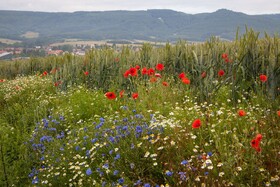


The dramatic decline in insects and birds, the pollution of the groundwater and two very hot and dry summers clearly show that changes are under way, to which both politicians and civil society must find answers.Agriculture is particularly badly affected by this and at the same time it is a contributor to this change.
The European Union is promoting agriculture in Europe with the "Common Agricultural Policy" (CAP) funding instrument. TheCAP has a major impact on the rural economy and natural habitats of the EU.In the last funding periods, the focus was in particular on increasing efficiency in agriculture and forestry.This led to an agriculture with monoculture, high use of pesticides, factory farming and also the loss of biodiversity, especially insects and microorganisms.
Lobby groups such as the farmers' association or the food industry have a great influence on the design of the CAP.Since the next CAP period (2021-2027) is currently being prepared, Naturefund would like to create more transparency here.To this end, Naturefund is currently preparing a participatory process to discuss past and future EU agricultural policy with farmers, citizens, schoolchildren and all the many people who are affected by EU agricultural policy. We would like to develop ideas, suggestions and visions for tomorrow's agriculture together.
Naturefund therefore started a participatory process in November 2019 to think about new ways in agriculture with interested parties from different areas.What must tomorrow's agriculture look like in order to enable farming families, the citizens and the diversity of animals and plants to lead a good and healthy life?
On the one hand, the event is about information about the effects of the agricultural reform and the possibilities of influencing organizational processes.On the other hand, the thoughts and approaches that are important for the farming families and for the people of a region should be included in the process.
Therefore individual topics are discussed in small groups and ideas are collected that can contribute to a better EU agricultural reform.How could and what must tomorrow's agriculture look like so that the farming families have a good livelihood?What has to change in the national and European agricultural policy so that we have a future with healthy food, intact soil, landscapes rich in species and stable ecosystems?
Finally, suggestions are formulated, which are then forwarded directly to the relevant commissions.It is a sign of lived democracy: We think for ourselves, we act ourselves and want to have a say in the laws that affect us.
In addition to the landscape, the EU agricultural reform also affects the direct income of the farming families and at the same time creates an overburdened bureaucracy that often creates more work than good.In addition, the EU's agricultural policy determines what our environment will look like over the next few decades.So the reform concerns each of us.We all want an intact environment, a variety of animals and plants, and healthy, high-quality food.
The first events took place in Elsfleth, Lower Saxony, Frankfurt, Hessen and Fuerteventura, Spain.Further events are planned in Romania, Vilmar, Hesse and the Netherlands, but have been postponed for the time being.
The first three events had the following results
